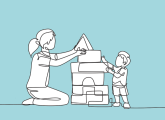Passion and commitment are omnipresent, but the focus and priorities of educators can vary considerably, says Carley Sefton…
I’ve always been interested in the varied ways teaching is approached around the world.
For a long time I believed that ‘children are children’ and that there is no need to teach them differently just because of their nationality, but the more time I spend in settings overseas, the more I appreciate the importance of understanding the cultural differences that inform the way children learn.
While working in a high school in Hong Kong I asked a class, “What is your favourite scene?” – referring to a play we had just watched.
In the UK this type of question would normally result in a lot of hands up and shouting out, but I was met with respectful silence.
A teacher later explained to me that the children would not give an answer until they’d had time to consider their opinion and would only contribute if they felt they had something valid to say – a very different style to the UK and US schools I had experienced.
Over the last two years, Learning through Landscapes has been lucky enough to be involved in an early years research project called ‘Take Me Out’, which looks at how our approach to outdoor learning in early years settings differs across Slovakia, Estonia, Denmark, England and Scotland.
As you can imagine, when approaching a project like this there are some basic differences that have to be addressed.
One of the surprising things we discovered quickly is that early years staff are all called different things!
Staff in Estonia and Slovakia are always referred to as teachers, with settings in Estonia being structured much more like the UK’s primary schools (a degree level-qualified teacher and classroom assistant in each class), while in Slovakia we saw ratios of one teacher to 20 children.
Denmark refers to staff as pedagogues while in the UK we favour the term ‘practitioners’.
The resourcing of outdoor spaces also differs hugely: as in the UK, the Danish are placing increasing importance on loose-parts play, open-ended resources and enabling creativity in their provision; this has had an impact on how settings are resourced and how they set out their outdoor space.
The Slovakians are very well resourced but focus a lot more on toys and access to information technology.
The approach to sleep became a really interesting area of discussion. Here, the UK is very flexible, working to the needs of the child, whereas the Danes expect that if a child needs sleep they will find time on the bus on the way home!
Slovakia, on the other hand, puts much more emphasis on the importance of sleep, with all children getting into their PJs and beds in a designated ‘sleeping room’ for at least two hours after lunch.
Risk taking proved a passionate area of debate. Unsurprisingly, safeguarding was a priority within the UK and we were much more cautious about the use of fire in settings than in some other countries (especially Slovakia, where campfire culture is embedded into family life from a young age).
However, the Slovakians were amazed at the way the Danes grew and harvested their own food with the children. Estonia, where outdoor learning is in its infancy, focused a lot more on the risks associated with taking children outdoors in cold and icy weather.
This project has seen the team travel to each of the countries involved to really begin to understand what outdoor learning looks like across Europe, and I am delighted that the outcome of all this work has been made into a free online book and website full of resources and lesson ideas to help get you outside as much as possible (visit takemeoutproject.eu).
I have really enjoyed beginning to understand how and why things are done so differently across Europe, but I can honestly say the most important thing I have learned is that the passion and commitment of early years staff across the countries we worked with is amazing, and that surely means that the education of the youngest members of our society is in safe hands.
Carley Sefton is the CEO of Learning Through Landscapes – a UK charity dedicated to enhancing outdoor learning and play for children. For services and resources for early years settings, visit ltl.org.uk.

Emotional wellbeing – Why empathetic connection is key
Editors picks
